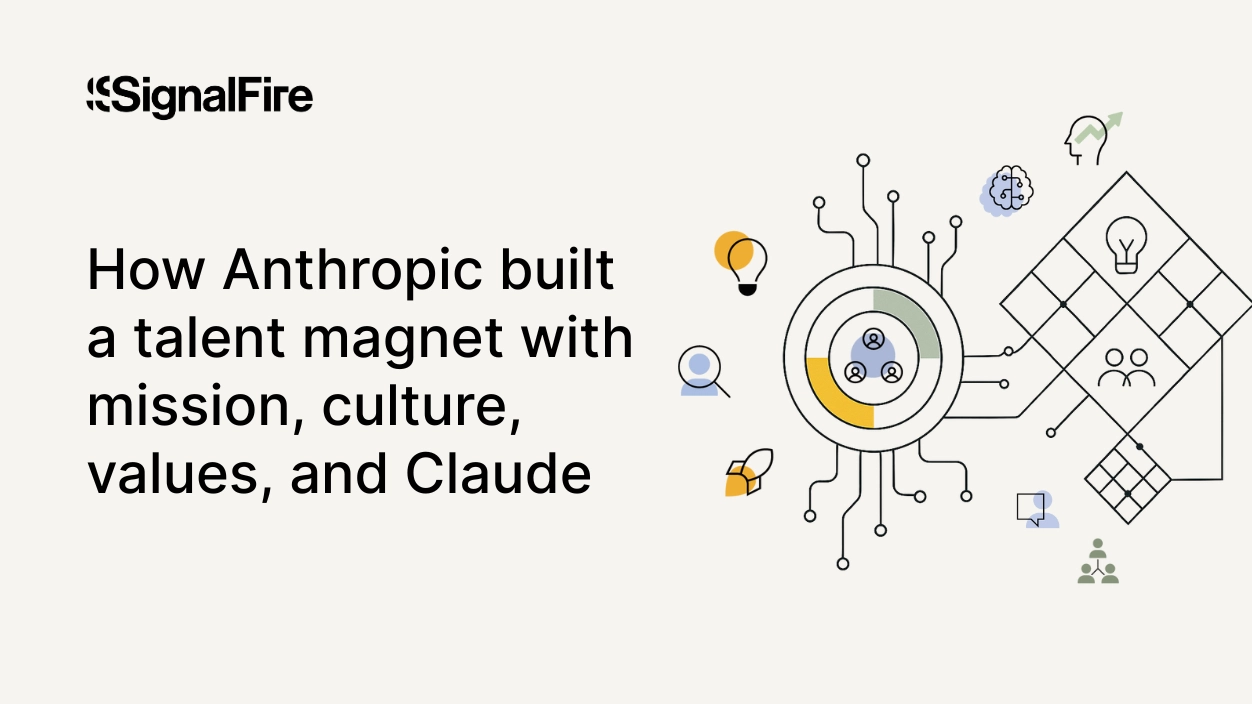
At SignalFire, we closely follow companies that excel at attracting and retaining top talent, and Anthropic is in a league of its own. With an 88% offer acceptance rate for tech roles and a remarkable 95% for go-to-market roles, the company is dominating talent acquisition in the ultra-competitive AI space. And it’s not just about getting people in the door. Anthropic also keeps them, boasting an 80% retention rate, which isn’t just the highest amongst the labs, it’s world-class across the tech industry at large.
How do they do it, and what can startups learn from their unique talent strategy?
We partnered with Nick Lewis, Head of Global GTM Recruiting at Anthropic, to explore the strategies behind the company’s exceptional retention and standout talent approach.
Company mission is the strongest core differentiator
What makes top talent pick one company over another, especially when everyone’s offering great pay, perks, and cutting-edge work?
At Anthropic, the answer is crystal clear: mission alignment. This isn’t just a hiring filter; it’s a retention strategy. Most employees stay because they believe in what they’re building.
The company is built around a powerful mission: ensuring the world safely transforms through AI. This clear and compelling purpose attracts passionate individuals who prioritize mission alignment above all else.
Nick: At Anthropic, we're comfortable turning away even top-tier talent if they don't resonate deeply with our mission and values. Our universal culture interview that is given to every candidate regardless of role is designed to assess whether someone will thrive in our high-cooperation, mission-first environment. We're looking for people who genuinely want to help the world navigate AI's transformation safely.
Heather: Anthropic’s emphasis on mission alignment is an especially powerful lesson for early-stage startups. Founders often underestimate how clearly articulating their mission and values can directly influence their ability to attract exceptional talent, even when resources are tight. You don’t need massive budgets to attract great talent; you need clarity. Rather than competing solely on perks or paychecks, startups should craft a genuine narrative that attracts candidates who are passionate about the company's purpose and the chance to have an outsized impact.
Find your unique employer-brand edge, be it mission, product love, or culture, and tell that story effectively to attract the right talent. This can help build a team that’s deeply invested in your long-term success.
Interviewing as a strategic responsibility, not a checkbox
At most companies, interviewing feels like an obligation squeezed between "real work." At Anthropic, they've flipped that script entirely. Interviewing isn't just part of the job—it's one of the most important contributions an employee can make to their mission.
Nick: At Anthropic, our approach starts with selectivity. Not everyone gets to interview candidates. Interviewers must have at least 30 days of tenure and complete rigorous, multi-stage training to demonstrate a deep understanding of our culture and values. While we move quickly due to our rapid growth, the training process ensures every interviewer is thoroughly prepared. This isn't about gatekeeping; rather, it's about ensuring every candidate interaction reflects who we are and what we're building.
When you interview at Anthropic, you're not just filling a seat on someone's calendar. You're actively shaping the team that will guide humanity through AI's most critical transition. That responsibility changes how people show up. Our interviewers come prepared, engaged, and genuinely invested in finding the right cultural fit
Heather: Anthropic’s disciplined interviewing process is something even early-stage startups can realistically emulate. Startups often rush hiring due to pressing needs, but this approach usually results in costly turnover or cultural mismatches. Instead, startups should consider embedding cultural alignment deeply into their interview process to ensure long-term retention and employee engagement, especially during periods of rapid scale.
Investing upfront in training a select group of interviewers, like the founding team or early employees, can help ensure consistent alignment with your core values. Even a simplified version of Anthropic's pre-interview prep, like kickoffs or scorecard calibration, can quickly align interviewers and improve hiring outcomes and team cohesion.
AI-human collaboration in talent acquisition
Anthropic uses Claude, its AI product, extensively in the hiring process to power every stage of the recruiting funnel except for making hiring decisions. AI is used to craft thoughtful job descriptions, structured interview plans, and innovative questions. This is where their hiring strategy mirrors their product philosophy: AI should amplify humans, not replace them.
Nick: Claude acts as a strategic collaborator. We use it to draft job descriptions, generate interview plans, and even pressure-test hiring strategies. Claude also acts as a partner to refine our thinking, automate routine tasks, and enhance productivity. Our “AI Innovation Labs” help us continually refine AI use cases and workflows across the recruitment funnel.
Heather: AI collaboration in hiring is a great equalizer for startups. Founders sometimes overlook affordable, accessible AI tools that can streamline recruiting processes. Tools like Claude can help startups quickly draft compelling job descriptions, structured interview plans, and thoughtful outreach. Additionally, there are some affordable AI sourcing and interviewing tools, like Juicebox and Metaview, that can amplify a small team’s capabilities in sourcing and interviewing, giving startups leverage they previously lacked. Adopting these AI tools early can free up valuable founder time, improve candidate experience, and ensure consistency even with limited staffing.
At Anthropic, the interview starts with AI collaboration
Anthropic's expectations for AI fluency don't begin on day one of the job; they start during the hiring process. As outlined in their recently published AI candidate guidance, the company encourages candidates to collaborate with Claude throughout the application process—from refining their resume to preparing thoughtful questions about Anthropic’s research.
Nick: Because Claude is deeply embedded in our daily workflows, we look for people who are genuinely excited to work alongside AI, not just tolerant of it.
Whether it's using Claude to structure a compelling cover letter, research our Constitutional AI approach, or prepare for technical discussions, we want to see how candidates think with AI as a collaborator.
This philosophy extends beyond applications. During interviews, we might ask candidates to explain how they'd use AI to tackle a problem in their domain. The goal isn't perfection; it's seeing adaptability, creativity, and authentic engagement with AI as a thinking partner.
This approach doesn’t just assess technical fluency; it also reveals how a candidate thinks, solves, and adapts—all critical qualities in a fast-evolving industry.
Thoughtful transparency and the candidate experience
Candidate experience is both a courtesy and a competitive advantage. At Anthropic, they focus on clarity, respect, and structured interactions that leave candidates feeling valued regardless of outcome.
Nick: Our approach centers on setting clear expectations upfront. Candidates know exactly what to expect: our interview structure, our AI collaboration guidelines, and our focus on mission alignment. We invest in detailed preparation materials and ensure every touchpoint from initial outreach to final decisions reflects our values.
Heather: Every candidate interaction is a potential long-term relationship, and even rejections can be moments of connection. Business needs change fast in the early days, and a strong hire at Series B could be a rejected candidate at Seed. It’s a good idea to have every candidate who didn’t make the cut feel like they’d pick up the conversation with your company again. You want to nurture great candidates who are the wrong fit for your role today, the same way you’d want to nurture prospects who aren’t ready to buy your product.
Scaling with intentional co-location
Anthropic's location philosophy reflects its belief that the best work happens when thoughtful in-person collaboration meets strategic flexibility. Rather than defaulting to fully remote or fully in-office, it's built a model around meaningful presence and intentional co-location.
Nick: Our approach centers on a 25% in-office expectation: roughly one week per month in core hubs like San Francisco, New York, or Dublin. This strikes a balance between the deep collaboration our mission requires and the flexibility that attracts top global talent. For senior roles with established track records, we offer more flexibility, but even then, regular in-person collaboration remains essential.
Our location strategy reflects where our customers are, where the best talent is, and where we can build the strongest teams. We've learned that AI research and product development benefit enormously from high-bandwidth, in-person collaboration. The 25% expectation ensures teams can build real relationships and tackle complex problems together while still accessing talent beyond traditional tech hubs.
Heather: Startups should recognize that location strategy is a part of talent strategy. Anthropic’s flexible yet intentional approach to co-location offers startups an achievable model for hybrid work. There’s no one right way to do things, but what you choose sends signals to candidates about how you work and what you value. There’s no singular right answer yet between fully in-office, hybrid, or fully remote. The key is consciously weighing the tradeoffs for what this means for your available talent pool and ways of working. More flexible options will allow you to expand your hiring pool, but you have to put in the work to make remote collaboration a success. For smarter remote and hybrid work strategies, check out our WFH FAQ Guide.
Rethinking early-career hiring in the AI era
Rather than traditional new graduate programs, Anthropic takes a targeted approach to early-career hiring that reflects both the reality of AI's impact on entry-level work and its commitment to developing exceptional talent.
Nick: We continue to hire early-career talent selectively, focusing on specific teams where learning potential and mission alignment can flourish. Our performance engineering teams working on inference optimization and scaling have successfully brought in new graduates who demonstrate strong fundamentals and a passion for pushing the boundaries of AI capabilities. Similarly, our Alignment Science team occasionally identifies exceptional early-career researchers with relevant experience and a deep interest in AI safety.
On the go-to-market side, SDR roles have proven to be particularly well-suited for new graduates who combine strong communication skills with genuine curiosity about AI's enterprise applications and impact. These roles have evolved and now require AI fluency. Our SDRs use Claude daily for research, outreach personalization, and navigating complex customer needs, making them ideal roles for candidates eager to grow alongside our technology.
We've become more selective, but not closed off. The roles for early-career talent now require both foundational skills and genuine AI fluency. We're looking for people who can grow with the technology, not just alongside it. Whether it's a new grad engineer optimizing inference performance or an SDR crafting high-impact customer outreach, the early-career talent we hire often become some of our strongest contributors precisely because they're growing up with these transformative tools.
Heather: There’s a broader trend of early-career roles, especially for new graduates, declining due to shrinking budgets, smaller team sizes, and the rise of AI automation. This has forced startups to rethink entry-level hiring in the AI era, as every hire must clearly deliver outsized value. Like Anthropic, startups can focus selectively on early-career talent who demonstrate foundational skills and practical AI fluency.
Today’s new grads need to do more than just master AI tools; they need to show how they use them to boost productivity and creativity, and in many cases, how they improve or troubleshoot them. With fewer traditional pathways available, the training wheels are off. Candidates who already engage with open-source projects, bootcamps, self-initiated projects, or demonstrate an ability to creatively troubleshoot AI-generated outputs can show that they can immediately contribute. This targeted approach can help startups avoid resource-draining mishires and build a lean, AI-capable team from the ground up.
Building trust through vulnerable leadership
At Anthropic, trust is more than a value; it’s an operating principle. From the company’s founding, leadership has embraced a model of vulnerable, transparent decision-making that creates psychological safety and long-term alignment across teams.
Nick: Rather than relying on top-down mandates, leaders at every level are encouraged to build genuine trust by openly sharing context, admitting when they don’t have all the answers, and making space for disagreement. This kind of authenticity creates the conditions for high ownership, fast learning, and resilient collaboration.
At Anthropic, we created a structure around this vulnerability. Regular company-wide AMAs, detailed postmortems of failed experiments, and forums for employee feedback (including anonymous ones) are institutionalized, making openness a habit. And data-driven decision-making underpins it all: our leaders combine emotional intelligence with transparent metrics to guide performance conversations, prioritize projects, and foster continuous improvement.
Trust isn’t built through perfection. It’s built through authenticity, openness, and consistent integrity. That kind of leadership doesn’t just feel good; it’s a key reason Anthropic continues to attract and retain exceptional talent in an increasingly competitive market.
Heather: Anthropic’s practice of vulnerable leadership is highly relevant to startup founders. Transparency, authenticity, and openness in decision-making build deep trust, especially when navigating uncertainty. Even small teams can implement structured feedback loops, regular AMAs, or honest retrospectives to build psychological safety and foster a resilient culture. Founders modeling authenticity and humility encourage a healthy, adaptable team environment that retains talent through inevitable startup challenges.
Anthropic’s commitment to experimentation and the space it gives for risk and failure are major draws for experienced talent. Startups can replicate this by building in things like hackathons, 10% time, or even simply encouraging experimentation tied to the company’s mission. When you make room for this structurally, you not only spark innovation, but you also make your company more appealing to top candidates.
Final takeaways: What startups can learn from Anthropic
Anthropic’s success isn’t solely due to competitive compensation or impressive tech. It comes from strategically embedding a mission-driven culture, thoughtfully leveraging AI, prioritizing the candidate experience, and scaling with intention. Startups looking to compete on talent should consider emulating Anthropic’s focus on authentic culture-building, ethical AI use, and radical transparency.
Nick: We’re not perfect, but being genuinely mission-driven, transparent, and human-centric in every aspect of recruiting and retention has positioned Anthropic uniquely in a highly competitive landscape.
By combining these strategies, we’re building an exceptional team and defining the future of talent management.
Heather: Whether you're hiring employee #5 or #500, the fundamentals still apply. Lead with clarity, build systems around your values, and never underestimate the power of a thoughtful candidate experience.
Anthropic’s talent strategy proves that mission, structure, and AI collaboration are stronger than compensation alone. What matters isn’t the quantity of resources, but the clarity of purpose behind how they’re used.
To learn more about the latest trends and talent transformations reshaping the tech industry, explore our 2025 State of Tech Talent Report.
*Portfolio company founders listed above have not received any compensation for this feedback and may or may not have invested in a SignalFire fund. These founders may or may not serve as Affiliate Advisors, Retained Advisors, or consultants to provide their expertise on a formal or ad hoc basis. They are not employed by SignalFire and do not provide investment advisory services to clients on behalf of SignalFire. Please refer to our disclosures page for additional disclosures.
Related posts

Battle-tested playbooks: How top CX leaders are using AI agents to redefine customer support

Why the smartest engineers are rewriting their career paths right now

SignalFire Report: Who’s really building Health & PharmaTech unicorns





